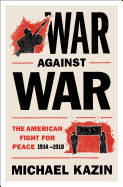
Michael Kazin is a professor at Georgetown and co-editor of the magazine Dissent. In War Against War, his history of the U.S. pacifist movement against involvement in World War I, he sympathizes with his subjects. He also expertly conveys the complex and electric prewar political landscape, and the constellation of reasons that many Democrats, Republicans, Socialists, farmers, feminists, left-wing trade unionists, segregationists and liberal immigrants had for banding together in this common cause, and then for breaking apart again.
This was an antiwar movement that Kazin says would not be rivaled until 50 years later, during the Vietnam War. And, he says, U.S. involvement may have shortened the war by a year, but it also allowed for the excessively punitive Treaty of Versailles, which in turn "touched off nearly thirty years of genocide, massacres, and armed conflict between and within nations.... The doughboys who helped win the war also made possible a peace of conquerors that stirred resentment on which demagogues and tyrants of all ideological stripes would feed." If we had not entered World War I, he asserts, there would have been no World War II.
After the war, the pacifists were in many ways validated by popular opinion and Congressional actions. Kazin touches on how the same arguments on either side continue to play out in U.S. politics today, including the struggle over whether American citizens should reject loyalties to other nations or cultural identities, or embrace "the ethnic pluralism that had the potential to turn the United States into a 'transnational' republic that could become an exemplar of tolerance to the world." --Sara Catterall

